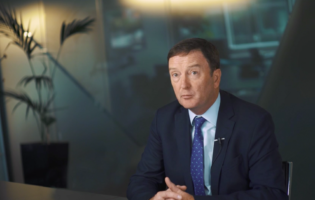Investment Outlook - Market Update

On entering 2023, investor sentiment was quite pessimistic, cautious on risk assets and expecting a recessionary environment to prevail. In contrast to this expectation, 2023’s outcome turned out to be a strong overall year for global economies and resultant positive returns from risk assets. The year saw, a strong first 6 months, predominantly driven by the magnificent seven technology names, a flatter third quarter followed by a deeply pessimistic and challenging period through September and October and finally a much broader rally through to year end. The driving factor through all these periods was investor reaction ‘flip-flopping’ with the expected interest rate expectations. We now enter 2024 with consensus sentiment very positive for risk assets, with meaningful interest rate cuts, lower inflation and no recession expected.
At KBI, our near-term cyclical outlook is less sanguine and expect the pattern of volatile ‘flip-flopping’ investor sentiment to continue. The ‘not too-hot, not too-cold, just right’ goldilocks consensus will not be smooth-sailing and we expect periods where once again the worry that inflation is too strong, or perhaps that growth is too weak suddenly re-appears. Our view is that growth will be slower than consensus expects and that an eventual mild recession (rather than soft landing) will occur. We also highlight that 2024 will be a major year for politics with not just the US Presidential election but upwards of 40 elections scheduled globally. Geopolitical tensions will likely be a major influence through the year. This causes us to be less bullish overall, more defensive in our positioning and mindful of an expected market background against which risk assets should struggle.
From a more secular perspective, we emphasise that despite the short-term focus we are in a period of ‘regime change’. A regime where its likely to be a world where 2% inflation is a floor rather than the ceiling for example. This is particularly the case for interest rates. So, despite excitement about expected rate cuts or lower bond yields for 2024, we continue to believe that the period of extremely low rates that prevailed post the 2008 crisis period was an historic anomaly and therefore there is a limit to which central banks will lower rates over coming quarters or indeed that bond yields may decline. This regime change is a ‘new world’ scenario, yet to be fully appreciated by many investors.
Asset class outlook:
Equities
The significance of ‘regime change’ for us is it’s implication for the normalisation of asset class valuations, not just interest rates and bond yields, but also equity valuations. While a strong year for returns, 2023 was not normal, noting how the equity return saw the narrowest market return since 1987, dominated by seven mega capitalisation US stocks. As a result, market multiples have expanded in excess of earnings growth and are now at an aggregate level trading greater than historic averages. For 2024, markets should be more driven by fundamentals than hype or sentiment .
We highlight that within equity markets there are large valuation disparities with excessive valuations in growthier sectors such as the artificial intelligence names that dominated 2023, compared to attractive entry points for value or higher yielding sectors. Our economic scenario of a mild recession and avoiding a hard landing should be a catalyst for a rotation and broadening of performance across the market, rewarding good stock picking.
At a regional level we continue to note that the North American equity market in aggregate looks the most expensive compared to history. In contrast, European and Emerging Market equity markets look much more attractively valued. We specifically highlight Japan, a market our global team highlighted during 2023 as a market with strong fundamentals which should continue to underpin its attractive outlook.
Bonds
Bonds as an asset class have experienced two difficult back-to-back years of performance during 2022 & 2023. With the aggressive central bank rate rising environment now behind us the outlook is less hostile. That said, we aren’t particularly bullish on the outlook for bonds, noting yield levels that are more fairly valued to us, than cheap. The reality of increased supply from growing fiscal deficits should also weigh on global bond markets.
Risk wise, we are increasingly monitoring corporate bond markets for any signs of distress at a company or indeed sectoral level. We note that they could be vulnerable as both the cost of funding has increased sharply and our expectation for less positive economic growth than consensus expects. At this stage corporate bond spreads are not indicating any material signs of stress.
Disclaimers:
KBI Global Investors Ltd is regulated by the Central Bank of Ireland. Please note that, as of 1 January 2023, KBI Global Investors Ltd. has withdrawn from the UK’s Temporary Permissions Regime (the “TPR”) on the basis that the firm is availing of an exclusion available for overseas persons. KBI Global Investors (North America) Ltd is a registered investment adviser with the SEC and regulated by the Central Bank of Ireland. KBI Global Investors (North America) Ltd is a wholly-owned subsidiary of KBI Global Investors Ltd. ‘KBI Global Investors’ or ‘KBIGI’ refer to KBI Global Investors Ltd and KBI Global Investors (North America) Ltd.
Under MiFID II this is deemed marketing material and should not be regarded as investment research. This material is provided for informational purposes only and does not constitute an offer to sell or the solicitation of an offer to purchase any security, product or service including any group trust or fund managed by KBI Global Investors. The information contained herein does not set forth all of the risks associated with this strategy, and is qualified in its entirety by, and subject to, the information contained in other applicable disclosure documents relating to such a strategy. KBI Global Investors’ investment products, like all investments, involve the risk of loss and may not be suitable for all investors, especially those who are unable to sustain a loss of their investment.
PAST PERFORMANCE IS NOT NECESSARILY INDICATIVE OF FUTURE RESULTS.
This introductory material may not be reproduced or distributed, in whole or in part, without the express prior written consent of KBI Global Investors. The information contained in this introductory material has not been filed with, reviewed by or approved by any regulatory authority or self-regulatory authority and recipients are advised to consult with their own independent advisors, including tax advisors, regarding the products and services described therein. The views expressed are those of KBI Global Investors and should not be construed as investment advice. We do not represent that this information is accurate or complete and it should not be relied upon as such. Opinions expressed herein are subject to change without notice. The products mentioned in this Document may not be eligible for sale in some states or countries, nor suitable for all types of investors. Past performance may not be a reliable guide to future performance and the value of investments may fall as well as rise. Investments denominated in foreign currencies are subject to changes in exchange rates that may have an adverse effect on the value, price or income of the product. Income generated from an investment may fluctuate in accordance with market conditions and taxation arrangements. In some tables and charts, due to rounding, the sum of the individual components may not appear to be equal to the stated total(s). Additional information will be provided upon request. Performance for periods of more than 1 year is annualized. Gross results shown do not show the deduction of investment management fees. A client’s actual return will be reduced by the management fees and any other expenses which may be incurred in the management of an investment account. For example, a €1,000,000 investment with an assumed annual return of 5% with a management fee of 0.85% would accumulate €8,925 in fees during the first year, €48,444 in fees over five years and €107,690 in fees over ten years.




